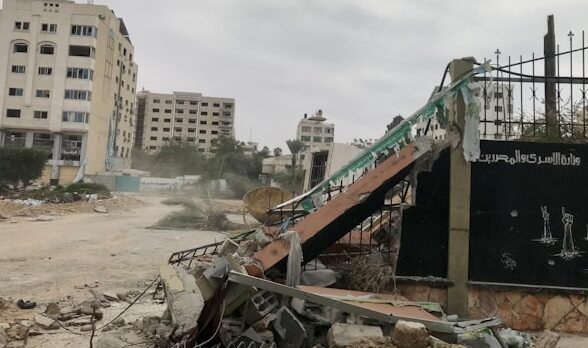ICC prosecutor accuses Israeli officials of using starvation as a weapon of war, escalating Gaza’s crisis
As Israel’s war with Hamas continues to ravage Gaza, a chilling new chapter has emerged in the ongoing conflict: a deliberate siege that aims to starve Gaza’s civilian population into submission. In early March 2025, as a ceasefire began to crumble, Israel imposed a total blockade on the Gaza Strip, halting the flow of food, medicine, fuel, and electricity. This decision, defended by Israeli officials as a tactical move to force Hamas to negotiate, has drawn international condemnation for its devastating effects on Gaza’s two million residents.
Finance Minister Bezalel Smotrich and National Security Minister Itamar Ben Gvir openly supported the blockade, with Smotrich declaring it a way to open the “gates of hell” as quickly as possible. Similarly, Knesset member Moshe Saada openly admitted to the intention to starve Gaza’s population, saying, “Yes, I will starve the residents of Gaza, yes, this is our obligation.” The goal, according to Israel’s political leadership, was to make life unbearable for Gaza’s civilians and force Hamas into submission.
While such rhetoric might be expected in a time of conflict, the consequences of Israel’s actions have become a significant test for international law. In response to the unfolding humanitarian disaster, the International Court of Justice (ICJ) has begun hearings to investigate whether Israel’s actions constitute a violation of the UN Charter, particularly regarding its blockade of the UN Relief and Works Agency (UNRWA), which provides crucial aid to Gaza’s residents.
But it is the International Criminal Court (ICC) that has brought the most attention to Israel’s tactics. In an unprecedented move, the ICC has issued international arrest warrants for Israeli Prime Minister Benjamin Netanyahu and former Defence Minister Yoav Gallant. The charges are for war crimes and crimes against humanity, with a central accusation: that they orchestrated a policy of starvation as a method of warfare.
Embed from Getty ImagesThe Rome Statute, the founding treaty of the ICC, specifically prohibits the use of starvation as a weapon of war, describing it as “intentionally using starvation of civilians as a method of warfare.” This includes the willful obstruction of relief supplies, something the Israeli government has actively enforced. By imposing a blockade that deprives Gaza’s civilians of life-sustaining resources, the ICC’s prosecutor, Karim Khan, argues that Netanyahu and Gallant are guilty of perpetrating one of the most heinous war crimes.
As the blockade has stretched on, Gaza’s humanitarian crisis has worsened. By October 2024, a UN food assessment revealed that around 80% of Gaza’s population was facing “extreme hunger,” a figure that has likely only worsened since. The closure of bakeries, the halting of water desalination plants, and the growing shortage of essential goods have left Gaza’s civilians with few means of survival.
In early April 2025, the World Food Program reported that all 25 bakeries it supports in Gaza had been forced to close due to a lack of flour and fuel. The consequences of this are dire, as the lack of basic food items coupled with an already weakened healthcare system creates a perfect storm for disease outbreaks. An estimated 91% of Gaza’s population also faces water insecurity, exacerbating the humanitarian disaster.
The United Nations Office for the Coordination of Humanitarian Affairs (OCHA) has called this the worst humanitarian situation ever seen in the conflict, with no relief reaching Gaza for the longest period since hostilities began in October 2023. The ICC’s investigation into the use of starvation as a weapon of war is one of the most significant legal challenges Israel has faced, and the international community is watching closely to see if the precedent will be set for future cases involving the starvation of civilians in armed conflict.
